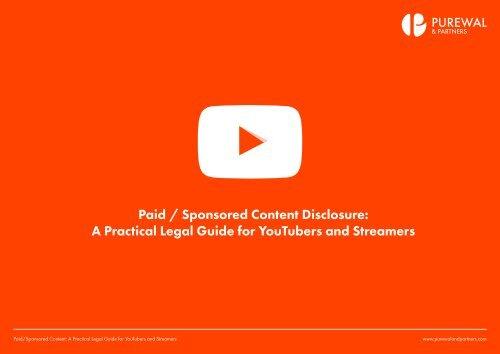
In the ever-evolving landscape of digital marketing, YouTube has emerged as a powerhouse platform were influencers wield significant sway over consumer behavior. With millions of views and a dedicated following, these creators have become vital partners for brands aiming to reach younger, engaged audiences. However, that influence comes with a complex set of legal considerations that can often be overlooked. As brands and influencers alike navigate the intricacies of contracts, disclosures, and regulations, understanding the legal nuances of influencer marketing becomes essential.In this article, we will delve into the labyrinth of laws governing YouTube influencer marketing, unmask the common pitfalls, and equip both creators and brands with the knowledge they need to engage ethically and effectively in this dynamic marketplace.
Understanding the Regulatory Landscape for Influencer Marketing
In the dynamic world of influencer marketing, particularly within platforms like YouTube, understanding the regulatory framework is crucial for both brands and influencers. The Federal Trade Commission (FTC) has outlined guidelines to ensure that advertising is transparent, protecting consumers from misleading marketing tactics. This is especially pertinent when influencers promote products or services, as audiences often perceive these endorsements as genuine recommendations rather than paid promotions. To navigate this landscape effectively, influencers must adhere to regulations that require the clear disclosure of their relationships with brands, typically through hashtags like #ad or #sponsored incorporated within their content.
Moreover, various platforms have instituted their own guidelines, which further shape the influencer marketing ecosystem. As an example, YouTube mandates that creators include disclosures in videos when they receive compensation or gifts. Additionally, brands collaborating with influencers shoudl conduct their due diligence to ensure compliance with both FTC regulations and platform-specific rules. Consider the following key points in influencer marketing regulations:
- Transparency: Ensure clear disclosures for paid promotions.
- Truthfulness: Avoid misleading claims about products.
- Accountability: Brands need to be aware of influencers’ practices.

Best Practices for Compliance: Dos and Donts for YouTube Creators
When navigating the complex landscape of influencer marketing on youtube, adhering to compliance is critical for maintaining credibility and avoiding legal pitfalls. Here are some essential dos to follow:
- Disclose Sponsored Content: Always transparently inform your audience when a video is sponsored. Use clear language like “sponsored by” or “paid partnership.”
- Follow YouTube’s Guidelines: Ensure your content aligns with YouTube’s community guidelines and advertising policies.
- Keep Records: Document agreements with brands and keep track of sponsored content for reference and legal safety.
On the flip side, here are some important don’ts to avoid missteps:
- Skip Disclosures: Never neglect to disclose sponsored or paid partnerships; it can diminish trust and attract legal consequences.
- Misrepresent Products: Avoid making exaggerated claims about products; always provide honest and accurate details.
- Ignore Local Laws: Don’t overlook the legal requirements specific to your region,including advertising standards and consumer protection laws.

Transparency and Disclosure: Building Trust with Your Audience
In an age where information travels faster than ever, transparency and disclosure have become cornerstones of ethical influencer marketing. Audiences are becoming increasingly savvy, often demanding clarity on whether popular YouTubers are being compensated for their recommendations or endorsements. To foster a genuine connection, influencers must openly communicate their partnerships. This should include clearly labeling sponsored content and offering insight into their relationships with brands. By embracing honesty, influencers not only adhere to legal standards but also cultivate a loyal following of viewers who trust their opinions.
Employing various strategies can enhance transparency in the influencer marketing space,such as:
- Using clear disclaimers: Phrases like “sponsored”,”ad”,or “paid partnership” should be prominently displayed.
- Engaging with the audience: Encouraging questions about product recommendations can enhance relatability and trust.
- Regularly sharing insights: Providing behind-the-scenes content about brand collaborations can demystify partnerships.
Visual aids, such as tables, can also effectively communicate disclosure practices. This can include:
| Platform | Disclosure Requirement |
|---|---|
| YouTube | Must use “ad” or “sponsored” in title/description |
| Must use #ad or #sponsored in posts | |
| Should include “ad” in tweets |

Legal Pitfalls to Avoid: Common Mistakes in Influencer Campaigns
In the fast-paced world of influencer marketing,it’s easy to overlook legal practices that coudl land creator and brand in hot water. A prevalent mistake is failing to disclose sponsorships properly. Influencers must adhere to the Federal Trade Commission (FTC) guidelines that mandate clear and conspicuous disclosure when they are compensated for promoting a product. Generic phrases like “thanks to [brand]” or “#ad” are often insufficient. Instead, influencers should use statements like “This video is sponsored by [brand]” to maintain transparency with their audience and avoid any repercussions from the regulatory body.
Another common pitfall involves intellectual property infringement. Brands often assume that influencers have the right to use any music, images, or video clips they come across online. tho, unauthorized use can lead to legal disputes and financial liabilities. It’s crucial for brands to establish clear guidelines and secure appropriate licenses for materials used in campaigns, safeguarding both the brand’s and influencer’s interests. below is a concise table summarizing key points to keep in mind:
| Common Mistakes | Consequences |
|---|---|
| Failure to disclose sponsorship | FTC penalties and loss of credibility |
| Infringing on intellectual property | Legal disputes and financial liabilities |
| Not vetting influencer’s content | Association with inappropriate content |
In Retrospect
As we draw the curtain on our exploration of YouTube influencer marketing and its legal labyrinth, it’s clear that this dynamic landscape is as thrilling as it is complex. The powers of persuasion wielded by influencers can drive trends, shape opinions, and even generate significant revenue. Yet, this influence comes tethered to a web of regulations, guidelines, and ethical considerations that practitioners must navigate with diligence and integrity.
Understanding the legal frameworks surrounding influencer marketing is not merely a hurdle to overcome; it’s an opportunity for transparency, trust, and lasting connections with audiences. As this industry evolves, so too must the strategies and practices employed by influencers and brands alike.
Whether you’re an up-and-coming content creator,a seasoned brand manager,or simply a curious observer,staying informed and adaptable is key. As we venture into this uncharted territory together, may we champion clarity over confusion, and collaboration over competition. The journey may be intricate, but with knowledge as our compass, we can embrace the full potential of influencer marketing—legally, ethically, and effectively. Thank you for joining us on this enlightening odyssey, and we hope you embark on your own journey into the heart of YouTube with newfound outlook.